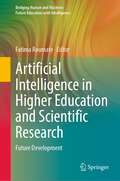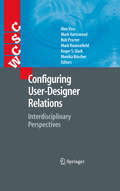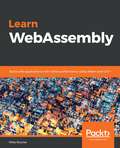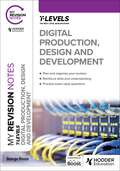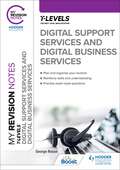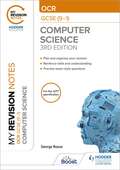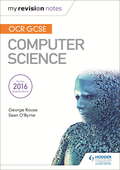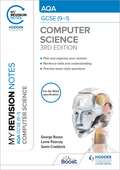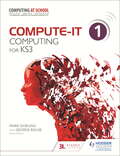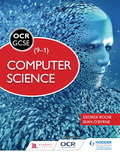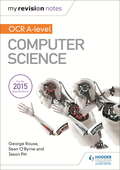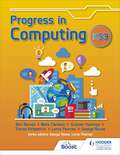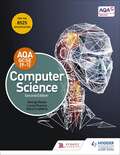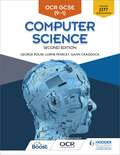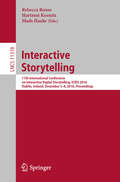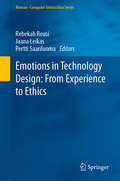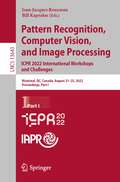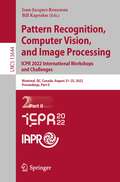- Table View
- List View
Artificial Intelligence in Higher Education and Scientific Research: Future Development (Bridging Human and Machine: Future Education with Intelligence)
by Fatima RoumateThis book explains the interaction between artificial intelligence and higher education. It explores artificial intelligence’s tangible and intangible impact on higher education and scientific research and discusses how higher education and scientific research enhance the progress of artificial intelligence technologies. Based on systematic analysis with a multidisciplinary approach and a combination of theory and practice, the book brings original perspectives from the massive use of artificial intelligence in higher education and scientific research since the appearance of COVID-19. This book also discusses ethics in artificial intelligence, taking into consideration the recommendation on ethics of artificial intelligence adopted by UNESCO. This book explains the importance of technological sovereignty and new strategies to face current and future challenges related to e-learning, deep learning, and machine learning.
Configuring User-Designer Relations: Interdisciplinary Perspectives (Computer Supported Cooperative Work)
by Mark Rouncefield Roger Slack Rob Procter Monika Büscher Mark Hartswood Alex Voss'User-designer relations' concerns the sorts of working relationships that arise between developers and end users of IT products - the different ways designers of IT products seek to engage with users, and the ways users seek to influence product design. It is through the shifting patterns of these relations that IT products are realised. Although it has generally been accepted that achieving better user-designer relations will improve the quality of IT products, there has been little consensus on how this might be achieved. This book aims to deepen our understanding of the relationships between users and designers both as they emerge in the wild and as a consequence of our attempts to intervene. Through a series of case studies the book juxtaposes in-depth explorations of different perspectives and approaches to thinking about - and doing - user-designer relations, considering important implications for design and computer science more generally.
Learn WebAssembly: Build web applications with native performance using Wasm and C/C++
by Mike RourkeIn the first definitive guide on WebAssembly, you’ll learn how you can wield this new technology to break through the current barriers of web development and build an entirely new class of performant applications .Key FeaturesGenerate WebAssembly modules from C and C++ using Emscripten and interact with these modules in the browser Learn how to use WebAssembly outside of the browser and load modules using Node.js Build a high-performance application using C and WebAssembly and port an existing C++ game to WebAssembly using Emscripten Book DescriptionWebAssembly is a brand-new technology that represents a paradigm shift in web development. This book aims to teaches programmers how to leverage this technology to write high- performance applications that run in the browser. This book will introduces you to the powerful WebAssembly concepts of WebAssembly that willto help you write lean and powerful web applications with native performance.You will start with the evolution of web programming, the state of things today, and what can be done with the advent and release of WebAssembly. We take a look at the journey from JavaScript to asm.js to WebAssembly. We then move on to analyzinge the anatomy of a WebAssembly module and the relationship between the binary and text formats, along with the corresponding JavaScript API.Further on, weyou'll implement all the techniques you've learned by to building a high-performance application using C and WebAssembly, and then port an existing game written in C++ to WebAssembly using Emscripten.By the end of this book, you would will be well-equipped to create high-performance applications and games for the web using WebAssembly.What you will learnLearn how WebAssembly came to be and its associated elements (text format, module, and JavaScript API)Create, load, and debug a WebAssembly module (editor and compiler/toolchain)Build a high-performance application using C and WebAssemblyExtend WebAssembly’s feature set using Emscripten by porting a game written in C++Explore upcoming features of WebAssembly, Node.js integration, and alternative compilation methodsWho this book is forIf you are a web developer or C/C++ programmer keen to leverage the powerful technology of WebAssembly to build high-performance web applications, then this book is for you.
My Revision Notes: Digital Production, Design and Development T Level
by George RouseUnlock your full potential with this revision guide that will guide you through the knowledge and skills you need to succeed in the Digital Production, Design and Development T Level core exams.- Plan your own revision and focus on the areas you need to revise with key content summaries and revision activities for every topic- Understand key terms you will need for the exam with user-friendly definitions and a glossary- Breakdown and apply scientific and mathematic principles with clear worked examples- Use the exam tips to clarify key points and avoid making typical mistakes- Test yourself with end-of-topic questions and answers and tick off each topic as you complete it- Get ready for the exam with tips on approaching the paper, and sample exam questions
My Revision Notes: Digital Production, Design and Development T Level
by George RouseUnlock your full potential with this revision guide that will guide you through the knowledge and skills you need to succeed in the Digital Production, Design and Development T Level core exams.- Plan your own revision and focus on the areas you need to revise with key content summaries and revision activities for every topic- Understand key terms you will need for the exam with user-friendly definitions and a glossary- Breakdown and apply scientific and mathematic principles with clear worked examples- Use the exam tips to clarify key points and avoid making typical mistakes- Test yourself with end-of-topic questions and answers and tick off each topic as you complete it- Get ready for the exam with tips on approaching the paper, and sample exam questions
My Revision Notes: Digital Support Services and Digital Business Services T Levels
by George RouseUnlock your full potential with this revision guide that will guide you through the knowledge and skills you need to succeed in the Digital Support Services and Digital Business Services T Level core and pathway core exams.- Plan your own revision and focus on the areas you need to revise with key content summaries and revision activities for every topic- Understand key terms you will need for the exam with user-friendly definitions and a glossary- Breakdown and apply scientific and mathematic principles with clear worked examples- Use the exam tips to clarify key points and avoid making typical mistakes- Test yourself with end-of-topic questions and answers and tick off each topic as you complete it- Get ready for the exam with tips on approaching the paper, and sample exam questions
My Revision Notes: Digital Support Services and Digital Business Services T Levels
by George RouseUnlock your full potential with this revision guide that will guide you through the knowledge and skills you need to succeed in the Digital Support Services and Digital Business Services T Level core and pathway core exams.- Plan your own revision and focus on the areas you need to revise with key content summaries and revision activities for every topic- Understand key terms you will need for the exam with user-friendly definitions and a glossary- Breakdown and apply scientific and mathematic principles with clear worked examples- Use the exam tips to clarify key points and avoid making typical mistakes- Test yourself with end-of-topic questions and answers and tick off each topic as you complete it- Get ready for the exam with tips on approaching the paper, and sample exam questions
My Revision Notes: OCR GCSE (9-1) Computer Science, Third Edition
by George RouseTarget exam success with My Revision Notes. Our updated approach to revision will help students learn, practise and apply skills and understanding. Coverage of key content is combined with practical study tips and effective revision strategies to create a guide students can rely on to build both knowledge and confidence.My Revision Notes: OCR GCSE Computer Science will help students:> Strengthen subject knowledge and key terms by working through clear and focused key content> Test understanding and identify areas for improvement with 'check your understanding' questions> Plan and manage a successful revision programme with the 'exam breakdown', 'countdown to the exams' and 'now test yourself' sections> Check answers to the practice questions against the answers provided> Enhance exam technique through exam-style questions and tips from leading author George Rouse
My Revision Notes: OCR GCSE (9-1) Computer Science, Third Edition
by George RouseTarget exam success with My Revision Notes. Our updated approach to revision will help students learn, practise and apply skills and understanding. Coverage of key content is combined with practical study tips and effective revision strategies to create a guide students can rely on to build both knowledge and confidence.My Revision Notes: OCR GCSE Computer Science will help students:> Strengthen subject knowledge and key terms by working through clear and focused key content> Test understanding and identify areas for improvement with 'check your understanding' questions> Plan and manage a successful revision programme with the 'exam breakdown', 'countdown to the exams' and 'now test yourself' sections> Check answers to the practice questions against the answers provided> Enhance exam technique through exam-style questions and tips from leading author George Rouse
OCR GCSE Computer Science My Revision Notes 2e
by George RouseManage your own revision with step-by-step support from experienced teachers and examiners Sean O'Byrne and George Rouse. Use specific case studies to improve your knowledge of Computer Science. Apply terms accurately with the help of definitions and key words.-Plan and pace your revision with the revision planner-Use the expert tips to clarify key points-Avoid making typical mistakes with key expert advice-Test yourself with end-of-topic questions and answers and tick off each topic as you complete it-Get exam ready with last minute quick quizzes at www.hoddereducation.co.uk/myrevisionnotes
My Revision Notes: AQA GCSE (9-1) Computer Science, Third Edition
by George Rouse Gavin Craddock Lorne PearceyTarget exam success with My Revision Notes. Our updated approach to revision will help students learn, practise and apply skills and understanding. Coverage of key content is combined with practical study tips and effective revision strategies to create a guide students can rely on to build both knowledge and confidence.My Revision Notes: AQA GCSE Computer Science will help students:> Strengthen subject knowledge and key terms by working through clear and focused key content> Test understanding and identify areas for improvement with 'check your understanding' questions> Plan and manage a successful revision programme with the 'exam breakdown', 'countdown to the exams' and 'now test yourself' sections> Check answers to the practice questions against the answers provided> Enhance exam technique through exam-style questions and tips from a leading team of expert authors
Compute-IT: Student's Book 1 - Computing for KS3 (Compute-IT)
by George Rouse Graham Hastings Zoe Ross Carl Turland Genevieve Smith-Nunes Ilia Avroutine James Abela Mark Dorling Phil Bagge Sarah LawreyCompute-IT will help you deliver innovative lessons for the new Key Stage 3 Computing curriculum with confidence, using resources and meaningful assessment produced by expert educators. With Compute-IT you will be able to assess and record students' attainment and monitor progression all the way through to Key Stage 4. Developed by members of Computing at School, the national subject association for Computer Science, and a team of Master Teachers who deliver CPD through the Network of Excellence project funded by the Department for Education, Compute-IT provides a cohesive and supportive learning package structured around the key strands of Computing. Creative and flexible in its approach, Compute-IT makes Computing for Key Stage 3 easy to teach, and fun and meaningful to learn, so you can:Follow well-structured and finely paced lessons along a variety of suggested routes through Key Stage 3Deliver engaging and interesting lessons using a range of files and tutorials provided for a range of different programming languages Ensure progression throughout Key Stage 3 with meaningful tasks underpinned by unparalleled teacher and student support Assess students' work with confidence, using ready-prepared formative and summative tasks that are mapped to meaningful learning outcomes and statements in the new Programme of StudyCreative and flexible in its approach, Compute-IT makes Computing for Key Stage 3 easy to teach, and fun and meaningful to learn. This is the first title in the Compute-IT course, which comprises three Student's Books, three Teacher Packs and a range of digital teaching and learning resources delivered through Dynamic Learning.
OCR Computer Science for GCSE Student Book
by George Rouse Sean O'ByrneBuild student confidence and ensure successful progress through GCSE Computer Science. Our expert authors provide insight and guidance to meet the demands of the new OCR specification, with challenging tasks and activities to test the computational skills and knowledge required for success in their exams, and advice for successful completion of the non-examined assessment.- Builds students' knowledge and confidence through detailed topic coverage and explanation of key terms- Develops computational thinking skills with practice exercises and problem-solving tasks- Ensures progression through GCSE with regular assessment questions, that can be developed with supporting Dynamic Learning digital resources- Instils a deeper understanding and awareness of computer science, and its applications and implications in the wider world
My Revision Notes OCR A level Computer Science
by George Rouse Sean O'Byrne Jason PittWith My Revision Notes you can: Take control of your revision: plan and focus on the areas where you need to improve your knowledge and understanding with advice, summaries and notes from expert authors Achieve your potential by applying computing terms accurately with the help of definitions and key words on all topicsImprove your exam skills by tackling exam-style and self-testing questions
Progress in Computing: Key Stage 3
by George Rouse Lorne Pearcey Ben Barnes Tristan Kirkpatrick Graham Hastings Mark ClarksonReboot your Key Stage 3 classroom with this all-in-one textbook that will inspire you to deliver creative Computing lessons with confidence.> Boost knowledge and skills in bite-sized chunks: every double-page spread represents a lesson's worth of targeted content and activities > Build understanding of the principles of Computing and improve IT skills with a range of engaging activities> Challenge students to think creatively about what they are learning and how it can be applied in the real world> Empower students to check and drive their own progress through Key Stage 3 and to GCSE, Cambridge Nationals and BTEC, and beyond, with regular knowledge check-ins and activities> Ensure complete coverage of the National Curriculum, with an easy-to-follow Progression FrameworkWe've listened to how you teach Computing at Key Stage 3 and designed our brand-new toolkit of digital and printed resources around you! Comprising of everything you will need to confidently deliver the National Curriculum in Computing and develop students' ICT skills, Progress in Computing: Key Stage 3 combines lesson plans, presentations, interactive resources, quizzes and assessments with a Student Book.The Progress in Computing digital and print 'toolkit' will be formed of 16 modules that can be used flexibly to suit a teacher's context. Our brand-new digital platform will also give you unparalleled flexibility in terms of choosing your own pathway through the resources, with the bonus of all elements being tagged clearly against the curriculum, our 2 and 3-year Scheme of Work and progression to Key Stage 4 qualifications.Digital resources include: - videos, animations, online self-marking coding challenges and worksheets - teaching and learning support and lesson plans including course planners for centres in England and Wales- a mixture of teacher-led, teacher-facilitated, plugged and unplugged activities- baseline assessment and an end of Key Stage 3 assessment, with auto-marked homework quizzes and end-of-module assessments track progress throughout the course. Sign up to our eUpdates to find out how to access our digital resources!
Progress in Computing: Key Stage 3
by George Rouse Lorne Pearcey Ben Barnes Tristan Kirkpatrick Graham Hastings Mark ClarksonReboot your Key Stage 3 classroom with this all-in-one textbook that will inspire you to deliver creative Computing lessons with confidence.> Boost knowledge and skills in bite-sized chunks: every double-page spread represents a lesson's worth of targeted content and activities > Build understanding of the principles of Computing and improve IT skills with a range of engaging activities> Challenge students to think creatively about what they are learning and how it can be applied in the real world> Empower students to check and drive their own progress through Key Stage 3 and to GCSE, Cambridge Nationals and BTEC, and beyond, with regular knowledge check-ins and activities> Ensure complete coverage of the National Curriculum, with an easy-to-follow Progression FrameworkWe've listened to how you teach Computing at Key Stage 3 and designed our brand-new toolkit of digital and printed resources around you! Comprising of everything you will need to confidently deliver the National Curriculum in Computing and develop students' ICT skills, Progress in Computing: Key Stage 3 combines lesson plans, presentations, interactive resources, quizzes and assessments with a Student Book.The Progress in Computing digital and print 'toolkit' will be formed of 16 modules that can be used flexibly to suit a teacher's context. Our brand-new digital platform will also give you unparalleled flexibility in terms of choosing your own pathway through the resources, with the bonus of all elements being tagged clearly against the curriculum, our 2 and 3-year Scheme of Work and progression to Key Stage 4 qualifications.Digital resources include: - videos, animations, online self-marking coding challenges and worksheets - teaching and learning support and lesson plans including course planners for centres in England and Wales- a mixture of teacher-led, teacher-facilitated, plugged and unplugged activities- baseline assessment and an end of Key Stage 3 assessment, with auto-marked homework quizzes and end-of-module assessments track progress throughout the course.
AQA GCSE Computer Science, Second Edition
by George Rouse Lorne Pearcey Gavin CraddockUpdated specification; first teaching September 2020. Specification code: 8525Written by leading Computer Science teachers, this textbook will guide students through the updated AQA GCSE Computer Science specification topic by topic, and provide them with standalone recap and review sections, practice questions, worked examples and clear explanations of complex topics.This textbook:>> Prepares students for assessment with numerous practice questions for all topics>> Develops computational thinking skills>> Provides differentiated material with the 'beyond the spec' feature>> Includes standalone recap and review sections at the end of each chapter>> Provides definitions of technical terms, along with a glossary of words to ensure students feel confident with the assessment.AuthorsGeorge Rouse, Lorne Pearcey and Gavin Craddock are highly respected and widely published authors of resources.
My Revision Notes: AQA GCSE (9-1) Computer Science, Third Edition
by George Rouse Lorne Pearcey Gavin CraddockTarget exam success with My Revision Notes. Our updated approach to revision will help students learn, practise and apply skills and understanding. Coverage of key content is combined with practical study tips and effective revision strategies to create a guide students can rely on to build both knowledge and confidence.My Revision Notes: AQA GCSE Computer Science will help students:> Strengthen subject knowledge and key terms by working through clear and focused key content> Test understanding and identify areas for improvement with 'check your understanding' questions> Plan and manage a successful revision programme with the 'exam breakdown', 'countdown to the exams' and 'now test yourself' sections> Check answers to the practice questions against the answers provided> Enhance exam technique through exam-style questions and tips from a leading team of expert authors
AQA GCSE Computer Science, Second Edition
by George Rouse Lorne Pearcey Gavin Craddock Ian PagetUpdated specification; first teaching September 2020. Specification code: 8525Written by leading Computer Science teachers, this textbook will guide students through the updated AQA GCSE Computer Science specification topic by topic, and provide them with standalone recap and review sections, practice questions, worked examples and clear explanations of complex topics.This textbook:>> Prepares students for assessment with numerous practice questions for all topics>> Develops computational thinking skills>> Provides differentiated material with the 'beyond the spec' feature>> Includes standalone recap and review sections at the end of each chapter>> Provides definitions of technical terms, along with a glossary of words to ensure students feel confident with the assessment.AuthorsGeorge Rouse, Lorne Pearcey and Gavin Craddock are highly respected and widely published authors of resources.
OCR GCSE Computer Science, Second Edition
by George Rouse Lorne Pearcey Gavin Craddock Ian PagetWritten by leading Computer Science teachers, this brand-new textbook will guide students through the updated OCR GCSE Computer Science specification topic by topic, and provide them with standalone recap and review sections, worked examples and clear explanations of complex topics.This Student Book:>> develops computational thinking skills in line with the new Practical Programming element of Component 02>> provides differentiated material with the 'beyond the spec' feature>> includes standalone recap and review sections at the end of each chapter>> includes answers to the Knowledge Check questions to support independent learning>> provides definitions of technical terms, along with a glossary of words that will be needed for assessment.Looking for answers for the Student Book? They can be found at the back of the print textbook.You can now access a free set of practice questions on the Hodder Education website. Please note, these questions are not endorsed by OCR and have not been subject to any OCR quality assurance processes.George Rouse, Lorne Pearcey and Gavin Craddock are highly respected and widely published authors of resources.
OCR GCSE Computer Science, Second Edition
by George Rouse Lorne Pearcey Gavin Craddock Ian PagetWritten by leading Computer Science teachers, this brand-new textbook will guide students through the updated OCR GCSE Computer Science specification topic by topic, and provide them with standalone recap and review sections, worked examples and clear explanations of complex topics.This Student Book:>> develops computational thinking skills in line with the new Practical Programming element of Component 02>> provides differentiated material with the 'beyond the spec' feature>> includes standalone recap and review sections at the end of each chapter>> includes answers to the Knowledge Check questions to support independent learning>> provides definitions of technical terms, along with a glossary of words that will be needed for assessment.Looking for answers for the Student Book? They can be found at the back of the print textbook.You can now access a free set of practice questions on the Hodder Education website. Please note, these questions are not endorsed by OCR and have not been subject to any OCR quality assurance processes.George Rouse, Lorne Pearcey and Gavin Craddock are highly respected and widely published authors of resources.
Interactive Storytelling: 11th International Conference on Interactive Digital Storytelling, ICIDS 2018, Dublin, Ireland, December 5–8, 2018, Proceedings (Lecture Notes in Computer Science #11318)
by Rebecca Rouse Hartmut Koenitz Mads HaahrThis book constitutes the refereed proceedings of the 11th International Conference on Interactive Digital Storytelling, ICIDS 2018, held in Dublin, Ireland, in December 2018. The 20 revised full papers and 16 short papers presented together with 17 posters, 11 demos, and 4 workshops were carefully reviewed and selected from 56, respectively 29, submissions. The papers are organized in the following topical sections: the future of the discipline; theory and analysis; practices and games; virtual reality; theater and performance; generative and assistive tools and techniques; development and analysis of authoring tools; and impact in culture and society.
Emotions in Technology Design: From Experience to Ethics (Human–Computer Interaction Series)
by Rebekah Rousi Jaana Leikas Pertti SaariluomaUnderstanding emotions is becoming ever more valuable in design, both in terms of what people prefer as well as in relation to how they behave in relation to it. Approaches to conceptualising emotions in technology design, how emotions can be operationalised and how they can be measured are paramount to ascertaining the core principles of design. Emotions in Technology Design: From Experience to Ethics provides a multi-dimensional approach to studying, designing and comprehending emotions in design. It presents emotions as understood through basic human-technology research, applied design practice, culture and aesthetics, ethical approaches to emotional design, and ethics as a cultural framework for emotions in design experience. Core elements running through the book are: cognitive science – cognitive-affective theories of emotions (i.e., Appraisal); culture – the ways in which our minds are trained to recognise, respond to and influence design; and ethics – a deep cultural framework of interpretations of good versus evil. This ethical understanding brings culture and cognition together to form genuine emotional experience. This book is essential reading for designers, technology developers, HCI and cognitive science scholars, educators and students (at both undergraduate and graduate levels) in terms of emotional design methods and tools, systematic measurement of emotion in design experience, cultural theory underpinning how emotions operate in the production and interaction of design, and how ethics influence basic (primal) and higher level emotional reactions. The broader scope equips design practitioners, developers and scholars with that ‘something more’ in terms of understanding how emotional experience of technology can be positioned in relation to cultural discourse and ethics.
Pattern Recognition, Computer Vision, and Image Processing. ICPR 2022 International Workshops and Challenges: Montreal, QC, Canada, August 21–25, 2022, Proceedings, Part I (Lecture Notes in Computer Science #13643)
by Jean-Jacques Rousseau Bill KapralosThis 4-volumes set constitutes the proceedings of the ICPR 2022 Workshops of the 26th International Conference on Pattern Recognition Workshops, ICPR 2022, Montreal, QC, Canada, August 2023. The 167 full papers presented in these 4 volumes were carefully reviewed and selected from numerous submissions. ICPR workshops covered domains related to pattern recognition, artificial intelligence, computer vision, image and sound analysis. Workshops’ contributions reflected the most recent applications related to healthcare, biometrics, ethics, multimodality, cultural heritage, imagery, affective computing, etc.
Pattern Recognition, Computer Vision, and Image Processing. ICPR 2022 International Workshops and Challenges: Montreal, QC, Canada, August 21–25, 2022, Proceedings, Part II (Lecture Notes in Computer Science #13644)
by Jean-Jacques Rousseau Bill KapralosThis 4-volumes set constitutes the proceedings of the ICPR 2022 Workshops of the 26th International Conference on Pattern Recognition Workshops, ICPR 2022, Montreal, QC, Canada, August 2023. The 167 full papers presented in these 4 volumes were carefully reviewed and selected from numerous submissions. ICPR workshops covered domains related to pattern recognition, artificial intelligence, computer vision, image and sound analysis. Workshops’ contributions reflected the most recent applications related to healthcare, biometrics, ethics, multimodality, cultural heritage, imagery, affective computing, etc.
